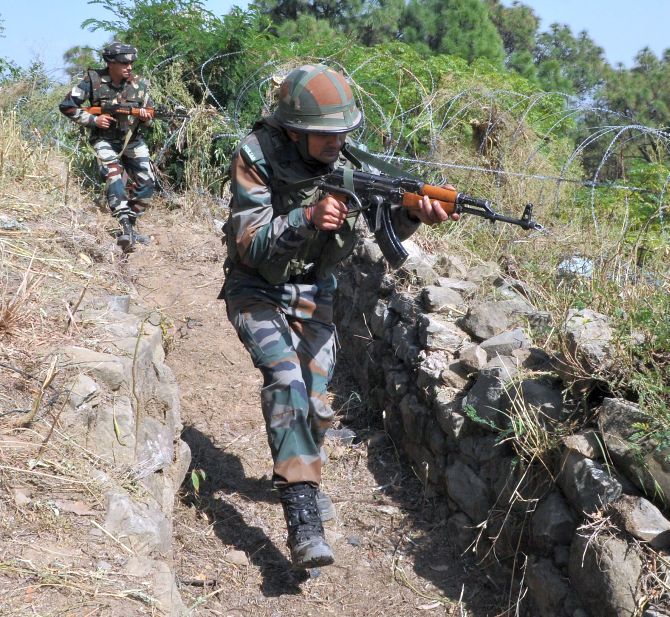'The only credible explanation for the niggardly approach to defence expenditure must be that the government does not expect a war.'
'But wars can happen when you don't expect them, and re-arming at the last minute is not possible,' says T N Ninan.

IMAGE: Indian soldiers on a search operation near the Line of Control in Jammu and Kashmir.
One of the abiding mysteries about the Narendra D Modi government is the way in which it has ignored the emerging contours of the country's external security situation, and squeezed the defence budget year after year.
The Budget for next year continues in the same vein, with the allocation for defence going up by less than 6 per cent, about the same as for the current year.
Over the five Budgets that cover the full span of the Modi government, the defence Budget will have gone up by just 38 per cent, which works out to an average of less than 7 per cent a year.
This barely keeps pace with inflation.
Since there have been large increases in pay because of the Pay Commission, the capital budget available for buying weapons has shrunk in real terms.
As a share of GDP, defence expenditure is down to 1.5 per cent, from 1.8 per cent in the terminal year of the last government.
These numbers exclude defence pensions, which add a staggering 0.6 per cent of GDP and is more than the defence capital budget, thanks in part to the indefensible decision on 'one rank-one pension'.
Specialists in the field say the non-pension component is the lowest since the traumatic 1962 border war with China.
Maintaining the outlay at 1.8 per cent of GDP would have given defence an additional Rs 500 billion next year and perhaps a cumulative total of Rs 1.5 trillion over all five years.
That money would have come in very handy for acquiring war equipment that the forces badly need: 10 squadrons of fighter aircraft, hundreds of helicopters, half a dozen submarines, minesweepers, missiles, howitzers, etc.
The defence squeeze is particularly difficult to understand because the Bharatiya Janata Party has traditionally been more security-oriented than other political parties.
From inception it was in favour of the country going nuclear; retired service officers join its ranks, and some have become ministers in the government.
For good measure, the finance minister has twice held defence as an additional portfolio. Yet, defence has got Cinderella treatment when it comes to financial allocations.
The context is important. The country faces a noticeably more aggressive China on its northern border. The military advantage vis-a-vis Pakistan has been eroding.
The Indian Air Force began looking for new combat aircraft to replace the MiG-21 nearly two decades ago, and is yet to get the first plane.
The Chinese navy, whose first ship entered the Indian Ocean less than 10 years ago, now has a minimum of eight ships in the Ocean at any point of time, with the number going up to 14 on occasion -- as the naval chief has said publicly.
China is also acquiring naval bases on the fringes of the Indian Ocean. During the last decade, the number of Indian naval ships has remained virtually unchanged -- with all the newly commissioned ones handicapped by the lack of critical equipment.
At this rate the traditional naval assumption that it could squeeze Chinese shipping at the choke point of the Malacca Straits, thereby posing a deterrent to Beijing, may no longer be valid.
The only credible explanation for the niggardly approach to defence expenditure must be that the government does not expect a war, and therefore has chosen to give priority to spending on infrastructure and other civilian needs.
But wars can happen when you don't expect them, and re-arming at the last minute is not possible.
Readers will recall that, after the terrorist attack on Parliament in 2001 and later the one on Mumbai in 2008, the forces were not able to offer military options to the political leadership.
Operation Parakram, for instance, ended in a pointless stand-off at the border. If there were to be a repeat situation today, the story would probably be no different.
The question is whether the country should worry about this situation, and whether the government should take a fresh look at the size of the defence budget.












 © 2025
© 2025